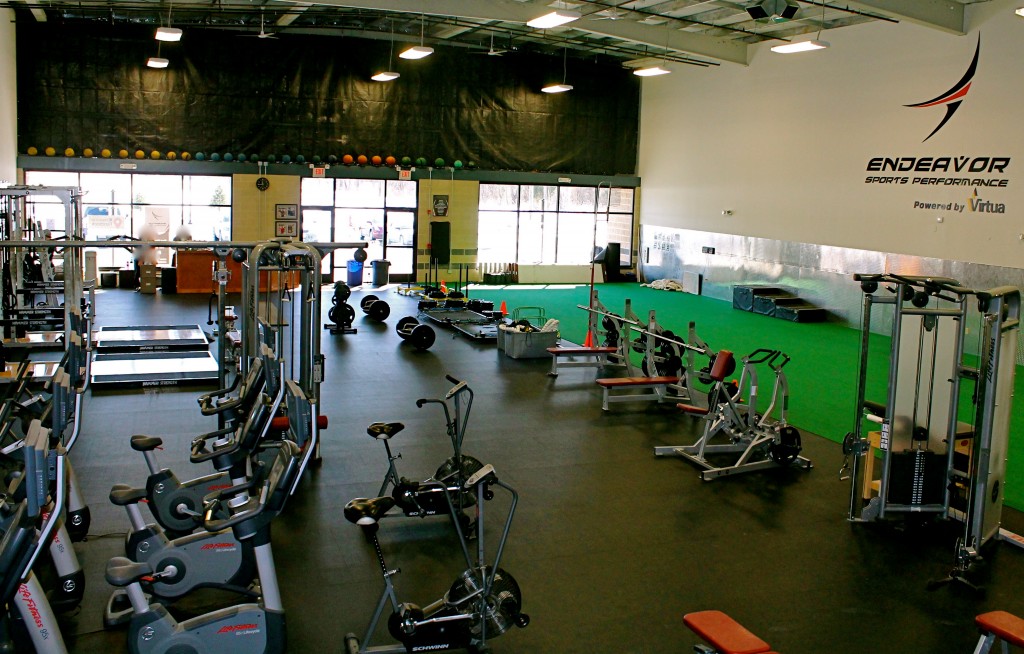We’re getting hit with another storm, so we had to close Endeavor today. Unfortunately, it means I had to cancel a bunch of manual sessions with the Flyers Junior Team and none of our clients can come in. On the bright side, I was able to sit at home and watch the Olympics and now have a few extra minutes to write.

Where the magic happens.
If you’ve followed this site for a while, you likely know that the system I’ve set up at Endeavor primarily revolves around small group training. In this environment, every client undergoes a comprehensive assessment, which is used along with their goals, age, gender, sport, training history, and a host of other factors to design the individual’s training program. Our clients are then coached through their individualized programs in a small group setting. This system provides us maximum opportunity to tailor the programs to the individual needs of the client. Also of note, I’ve found that youth athletes training within this system are so far out of their element that we essentially have zero work ethic or behavior issues. Being placed in a new setting, with new coaches, new training partners and a new process really streamlines productive behaviors and minimizes distracting or deleterious ones.
Team settings can be a little different, especially if you’re on the team’s “turf”, be it training a hockey team at their rink or going to a field or court to work with a group there. Simply, the kids are more comfortable, more likely to feed off one another, and there are more personalities to account for. Over the last few months, I’ve spent a lot of time working with youth teams of all ages, and have noticed a few trends that underlie today’s post on 5 things I think every youth athlete should know.
1) There are a lot of things you can’t control throughout your athletic career. Your attitude and effort are never one of them. You not only have the ability, you have the responsibility to control these things. One of the things I told a few of the younger hockey teams I helped work with a couple weeks ago was that one of the first questions that every coach asks when inquiring about a player is “Is he/she a good kid?”. In other words, it’s not just your athletic ability that coaches are looking at, it’s how you conduct yourself as an individual and as a member on the team, within and away from the sport. The higher the level of play, the more talented athletes you’re competing against, and the more likely someone with comparable ability, but a better attitude takes your spot.
Maybe more importantly, why would you ever WANT to play with anything less than your most positive attitude and best effort? Do you want to be known as the athlete that coaches don’t like coaching and teammates don’t like playing with? Is there anything to be gained by slacking off? I often ask athletes within a team setting, “Do you think what you’re doing is making your team better or worse? Is it helping you get better or worse?” Ask yourself this question frequently throughout your athletic careers. If the answer is better, keep doing what you’re doing. If it’s not, adopt better behaviors. It’s that simple.
2) Athletic development is a complicated topic. So much so, in fact, that most youth sport coaches and parents don’t understand it. I don’t expect youth athletes to either. One of the things I’m trying to do with the youth hockey program I work with is establish statistics about how many players stay within the program over the course of various time spans (e.g. 3-5+ years). The idea is to determine whether the organization, myself included, is truly developing the best players, or more cherry picking the best players from other teams and finding success that way. For example, if a significant proportion of the U-18 team was on the PeeWee Major team several years prior, that would be an indication that the club is doing a great job of developing players. There will be some degree of expected drop-out as some athletes will choose other sports, have dwindling interest, tryout for a team closer to home, or any number of other circumstances, but if we don’t have baseline statistics, we have nothing to compare against.
For the youth athlete, especially the “elite” youth athlete (I put “elite” in parentheses because I believe very strongly that there is no such thing as an elite youth athlete; in team sports, these terms are mutually exclusive), it’s important to recognize that the developmental time period is a crazy one, and you will see this all around you. Some kids grow way faster than others. Some pick up new movements/skills faster than others. Some appear to just flat out be better than others. None of these things, however, are predictive of FUTURE success. In other words, whether you’re the best or worse U-12 athlete has almost no indication of whether you’ll be the best or worst U-18 athlete in that sport. As athletes reach the tail end of puberty, the playing field is leveled a great deal and you’ll see a lot of the best younger athletes get surpassed by what people refer to as “late bloomers”, although they’re really just normal bloomers.
I heard the announcers during the US vs. Slovakia men’s hockey game today say that Ryan Kesler, an Assistant Captain in the NHL and now two-time Olympian, was cut from every team he tried out for growing up. I personally worked with a kid that played Tier-II U-18 hockey, went to a mediocre junior program, ended up going to a NCAA D1 school and just left after his sophomore year after signing a great contract with an NHL club. Regardless of how good you are now, you must always keep working to get better. There are countless athletes that want your spot.
3) “It’s okay to be tired. It’s not okay to look tired.” I’ve talked about this idea before (see: The Illusion of Invincibility), but controlling your body language can go a long way in how you’re interpreted by your coaches and by your opponents. Regardless of how tired you feel, carry yourself like you’re ready for more. Think of it this way: If you’re tired, it’s likely that your teammates and your opponents are also tired. If a coach looks at his team during a tryout, practice, or game, and sees everyone buckled over and you standing tall, who do you think will be interpreted as being in the best shape (This, of course, assumes you aren’t dogging it!)? Likewise, if the other team is tired and they look over at you, and you’re standing tall and staring back at them with a focused look, the mental advantage goes to you. This is a simple change, but it can make a huge difference. Never look tired.
4) Yesterday, a girl on a HS lacrosse team that we train said, “You reek of positivity. I just wanted you to know that” with a smile on her face. While I think “reek” is an…interesting…word choice, she meant it in a very positive way. As a coach, I try to lead with the team’s best interest in mind, at all times. In other words, the mentality is “Team First”. Every athlete, and every team, will have good days and bad days, but the focus should always be on behaving in a manner that will lead the group toward improvement. I would encourage you to adopt this mentality.
This isn’t just about working hard, as mentioned above. It’s about changing the way you interpret everything that happens within the team setting. Did your teammate not pass to you when you were open? Will it be better for the team if you yell at them, or if you wait until you have a moment to approach them and calmly discuss the play? If a ref misses a call, is it better to complain about it or just get back into and/or focus on the next play? Another angle on this idea lies in getting noticed/scouted, as it’s easy for athletes to want to do too much in an attempt to stand out. Remember that there are places on every team for athletes that make their teammates better. This isn’t always flashy, but it is effective and needed in every sport.
5) Switching gears a bit, it’s important that youth athletes understand the importance of eating REAL food. Real food can be hunted or grown. It was real food 1,000 years ago. Typically, real food goes bad if you don’t freeze it or eat it within a week or so of buying it. Broadly, this includes things like meat, fish, eggs, vegetables, fruits, and nuts. I get a lot of questions about nutrition, and it’s really a very simple topic to me. The harder question is “why aren’t you eating what you know you should be?”
I think parents are stuck in a tough place trying to balance what they want to eat personally, what they think their kids should be eating, and what they think their kids want to eat. I’m not oblivious to the fact that the home can become a hostile environment if the parents are trying to shove vegetables down their kids throats every night against their will. At the same time, it’s very funny to me when I hear youth athletes say things like “I don’t like vegetables”…or even more insane “I don’t like water.” As if these things are optional! Your body is quite literally made of the nutrients you provide it. The food you take in provides the building blocks for every structure and process within your body.
While I think creative cooking can make almost any food taste good, I would encourage youth athletes to start asking “Is this good for me?” in place of “Do I like this?” These don’t have to be mutually exclusive, but there will be times in your life where you have to do things that you don’t “like” because it’s better for you and the right thing to do. Make this easier on your parents by asking them to start buying more broccoli, spinach, carrots, peppers, and other vegetables. Eat them everyday. Eat the entire supply and ask your parents to buy more. If your parents aren’t good cooks, spend 5 minutes of the 5 hours you spend on your phone everyday searching things like “how to cook broccoli so it doesn’t taste awful” and see what comes up. There are reasons to believe that eating more vegetables can make you stronger, less injury prone, and give you more energy. Start eating them, and try to organize the majority of the rest of your food choices around real food.
The exciting part about all 5 of these points is that they are COMPLETELY within your control. You have the full power to influence your attitude, work ethic, and eating habits. Each of these will have a profound impact on your future and will help make you a healthier, more successful athlete, but you need to make the choice to do them. You cannot buy, “Google” or download athletic success. It must be accomplished the old fashioned way, with consistent, focused hard work, by doing the things others are unwilling to do.
To your success,
Kevin Neeld
OptimizingMovement.com
UltimateHockeyTraining.com
Please enter your first name and email below to sign up for my FREE Athletic Development and Hockey Training Newsletter!
“…an extremely rare comprehensive look at the present state of ice hockey training.”
“…a must-have for coaches and strength professionals at all levels of hockey.”
